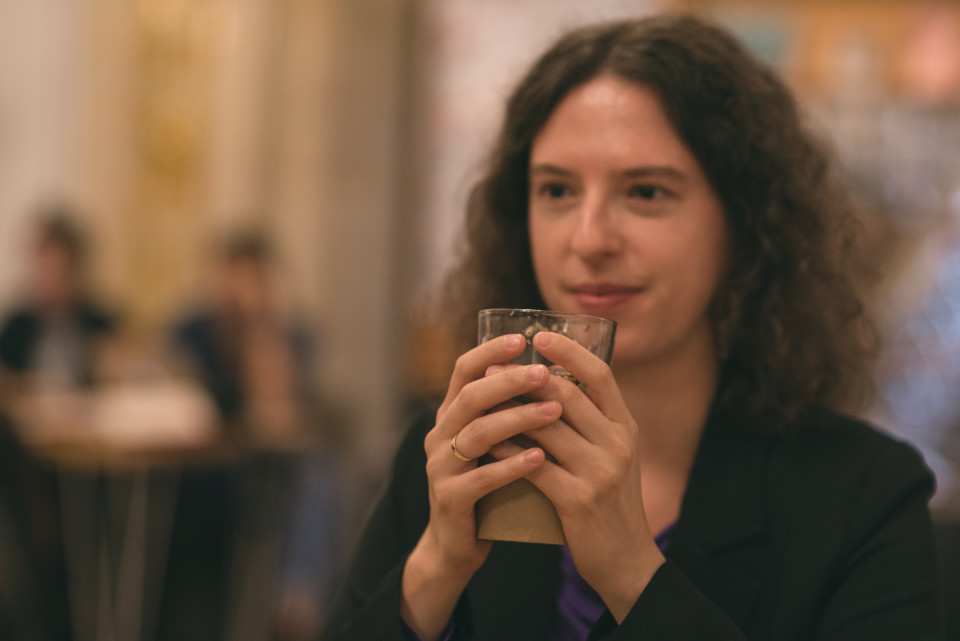H A N N A
Warsaw | 2017
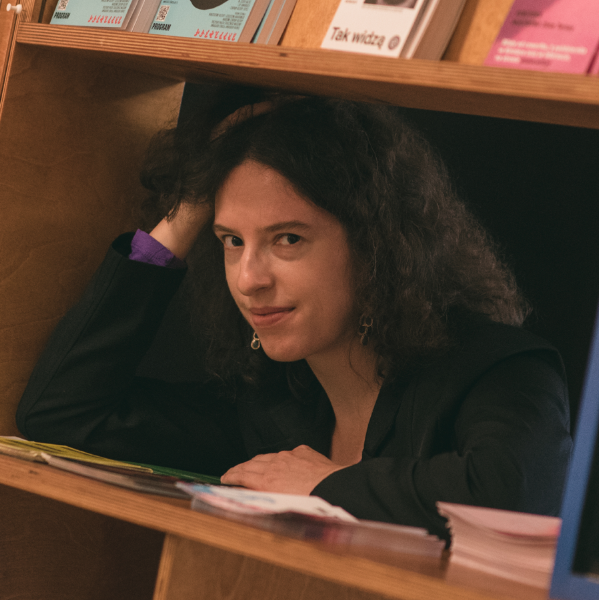
H A N N A
City — Warsaw
Age — 35
Love life — Married
Profession — Dance Theoretician, Scientific Researcher and Lecturer in Dance Science, Dance Critic, NGO Activist, Leader of a research laboratory for dance movement
Years in Warsaw — All her life
Location —Bar Studio in the Palace of Culture and Science
T H E W A R S A W S T O R I E S
‘WE HAVE
TO LEARN
TO SAY STOP
TODAY’
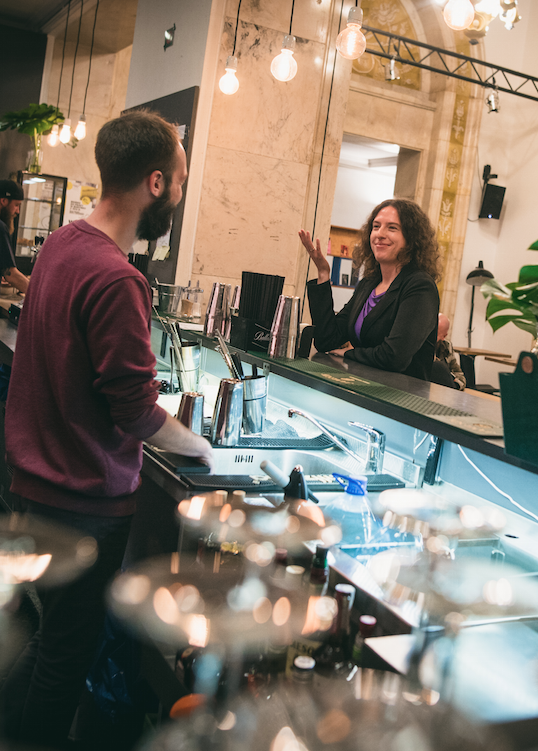
- What makes you really happy?
“Being with the person I love and who loves me: my husband. It makes me happy to have such a safe and precious relationship. It also gives me joy that my work as a dance theoretician will live on after me. My husband and I decided not to have children, so instead of my DNA I am giving my work to the world.”
- What is your best personality trait?
“Determination. If something is important to me and I believe in it, I go for it. Even if it’s hard. When you have a job like mine in Poland, it really needs to be your passion, because the circumstances are hard. Ours is not a necessary profession. Dance science officially doesn’t even exist, it’s considered part of drama science or musicology. We are all still pioneers in Poland, nothing has changed over the past hundred years. I can go really deep, wait for hours and work hard to make our dream come true – that someday dance will be an important part of art, activity and science in Poland. But that will not happen in a year, or even five years.”
- What makes you different from other people?
“My independence. I go my own way, even if that is the hardest way. I’ve learned not to compromise. I only do things I see as worthwhile, and I do it in a true and authentic way. This also counts for my personal life. We didn’t get married in a church and I didn’t wear a white dress. We wore sports shoes and our guests were allowed to wear whatever they wanted as well. We played songs from Star Wars, Jurassic Park and Dirty Dancing. What also makes me an exception is that my husband and I don’t feel the need to have children. Polish society is really traditional and conservative ̶̶ and I mean that in a bad way. They talk about women as things that are only created to give birth. And women who do decide to have children are treated mostly as incubators instead of human beings. We are in a really hard political place at the moment. The discourse is really, really strong now, but it’s nothing new. Poland is a very patriarchic, sexist country. The main discourse is, ‘Oh my god, how can you not have children? Who will take care of you when you grow old? How can you be so egoistic?’ And mainly, ‘You are not 100% woman, there’s something wrong with you, with your marriage and with your head, and you will find that you do want kids and that it will be too late.’ This last argument gets to me sometimes. I can’t say that I won’t change my mind someday. But I want to make my own choices and society shouldn’t be so much involved in my personal life.”
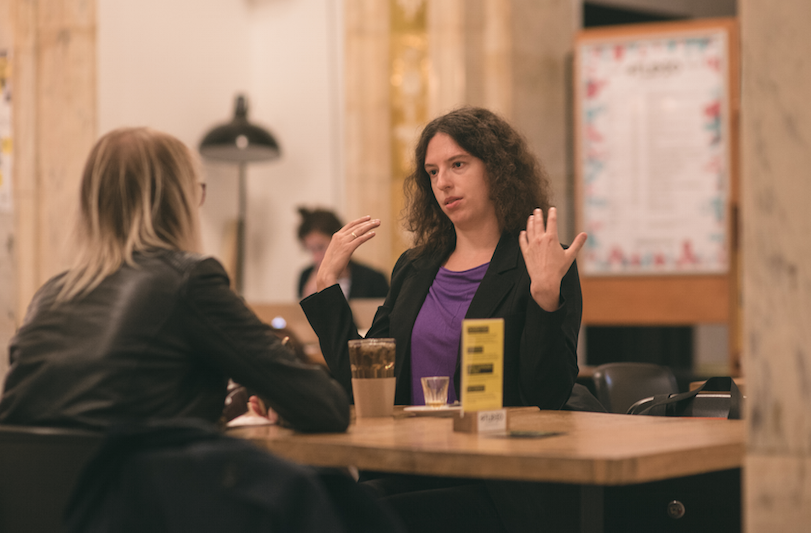
- What is your biggest struggle in life?
“Now I’m ready to talk about it. I had a depression. And I think I was suffering from it since I was a kid. I was afraid of everything. Those feelings got deeper and deeper until I only wanted to hide. I went to a really dark place. A good therapist and antidepressants helped me. So I think, and I say it with a smile, that my biggest struggle was dealing with being me and working through the dark and bad feelings I had about myself. And since I survived something really bad, a lot of other things are easier now. But I have to focus on introspection and check how I feel every day. Am I sad because something sad happened, or am I sad because the depression is coming back?”
- What is your biggest life lesson so far?
“Every person is dealing with something. Every person has his or her inside struggle, but you often can’t see it. This has a lot of influence on how I think about life. I try to empathize with people and understand them instead of judging them.”
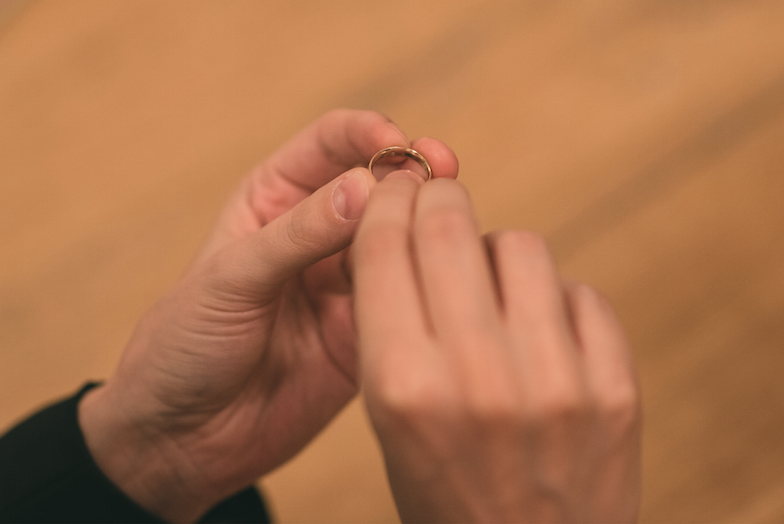
- What is the best thing that ever happened to you?
“Oh my goddess, that’s a simple answer – my husband. It’s the first relationship in my life that’s healthy, safe and respectful. The funny thing is, I didn’t fall head over heels for him. I thought we were too different. But the relationship evolved and got deeper. At one point I thought, why didn’t I notice before? It took time to see that this relationship is the base for me being totally and truly myself, and being loved for it. Because of love I feel stronger, smarter and more effective. Sometimes I would like to remind single friends, ‘Look in the corner, he might be there’.”
- What is the best advice anyone ever gave you?
“When I was at a children’s party as a young girl, I took a piece of paper out of a hat which said, ‘If you look at the moon with tears in your eyes, you will think the moon is crying too.’ I interpreted that as advice that you mustn’t be so sure that everyone feels the same way. Since then I’ve been aware that whatever I think may be totally different from what someone else is thinking. And I respect that.”
- What advice would you give other women in Europe?
“Don’t be nice to people who aren’t nice to you. I think that in European society, or maybe it’s only the Polish one, people expect totally different things from men and women. As women our parents tell us to be quiet, be nice, don’t say no, don’t be fast, don’t be strong, don’t be egoistic, think about other people, et cetera. I would rather say, do think about yourself and do think about your own needs! When I was six years old, I saw a television commercial. The father was just sitting at the table and his wife and daughters were dancing and singing and serving him a nice meal. That was the moment I became a feminist, even if back then I didn’t know the concept existed. I felt in my gut that something was totally wrong with that picture. Now our new government wants to reduce women to things that don’t speak or think. During the Black Protest, a lot of women dressed in black were walking the streets of Poland and shouting that no one can take away our reproductive rights. For me it was about fundamental things, about being a woman in a patriarchal society. I think that was the moment I said to myself, I don’t have to be nice, because this society isn’t nice to me. If we choose to be nice now, it will hurt the next generation of girls and women. We have to learn to say stop today.”
- What is your biggest sadness in life?
“That I can do so little in this life. I feel sad that big changes will not happen during my life. I will see some change, but I am not sure if I will see THE change. It’s somehow sad that my generation is taking small steps to benefit others, while we won’t see the outcome.”
- What does Warsaw mean to you?
“O, a lot. A lot of important historical figures lived here and important things happened here. I was born here, but it took me time to start liking it. Now I am definitely a big city person. I am totally spoiled. I live like a little queen in the main part of the city and I have everything I need around the corner. It is an exciting, fast, dynamic but also chaotic city. What I like best is that I have so many possibilities to develop myself here. The reason a lot of women come to Warsaw.”
- How would you describe women from Warsaw?
“I don’t believe in generalizations, but compared to other women in Poland, women in Warsaw might seem a bit more self-confident. They speak louder and make an appearance. Just like everyone else in Poland, they seem wary to connect to people outside their circle. People feel that if they open themselves up, others will notice them and try to shoot them down or be jealous. Kids are being raised to keep a low profile as well: don’t think so much of yourself, be quiet, stop it. That’s because of our history. People experienced horrible things during World War II and that trauma is handed from one generation to the next. During the Soviet influence after the war you couldn’t trust anyone, which made us realize it’s probably better not get too close to strangers. Polish people might seem a bit sad, like they lack joie de vivre. That’s because of the weather. You can get mad when the sun shines so little.”
Photos by Marta Ankiersztejn

